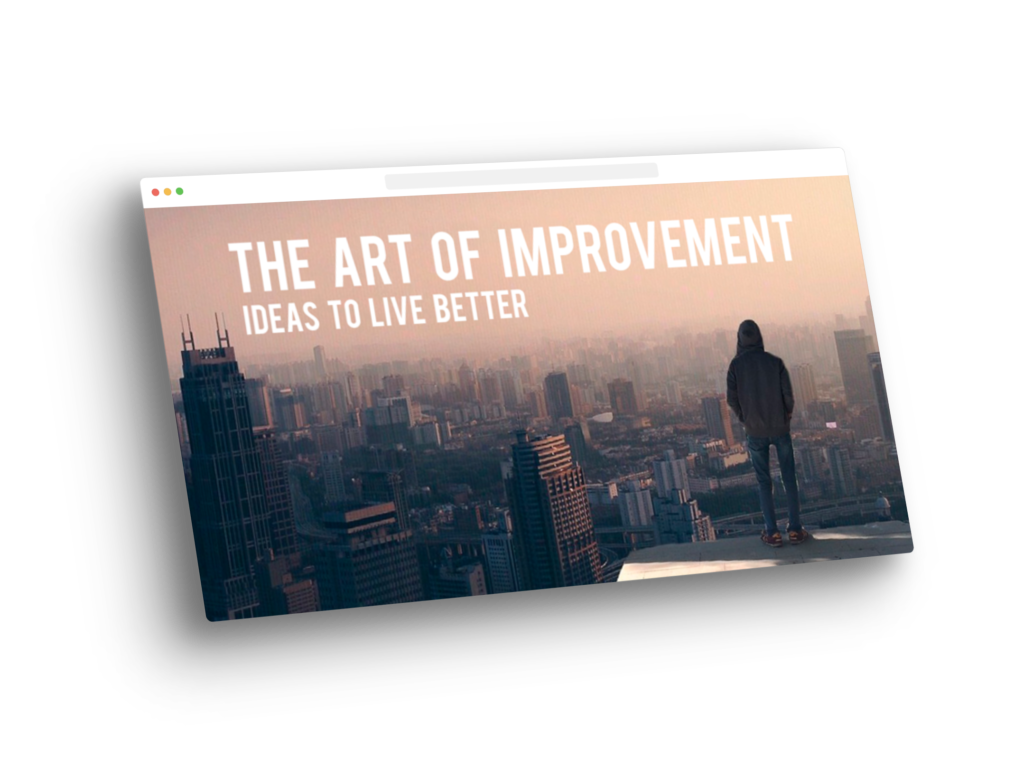How are things working for you? Is your life going the way you thought it would?
If you’re like most people, there are things that could be better. There are most likely some areas of your life that you’d like to change or improve upon.
So, if you want to make changes, how would you go about it? What could you do to implement new thoughts, feelings and experiences?
Well, if you want to change your life, one way to do it is to change the way you think. Here are five mindset shifts that may help you to do just that.
Fixed to Growth Mindset
Developing a growth mindset may be one way to start changing your life. Our brains are like a master computer that runs the programs that monitor our thought processes. If you want to change it, you have to think about what you’re thinking about!
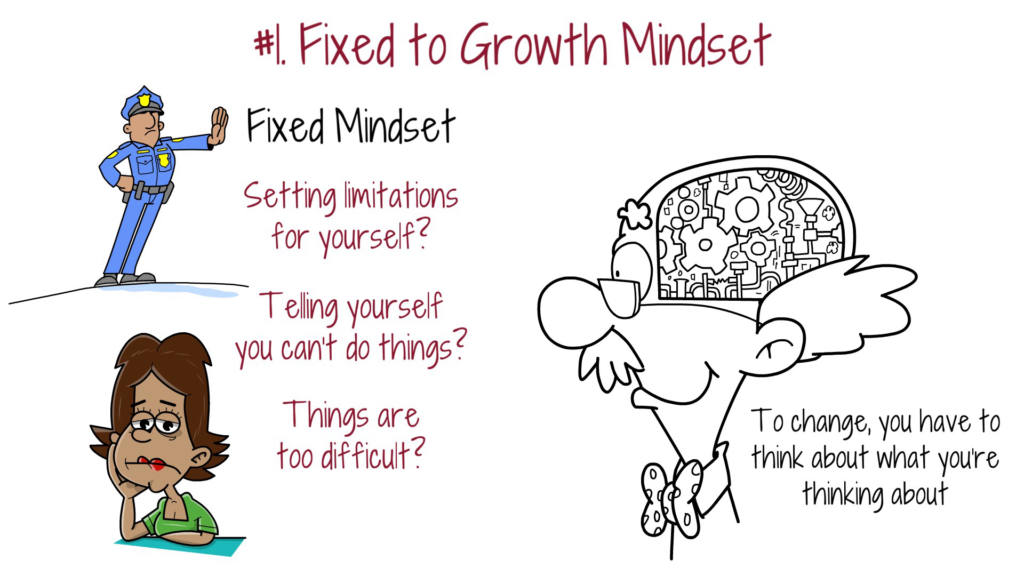
If you are in a fixed mindset, you may be setting limitations for yourself. People with fixed mindsets may be telling themselves they can’t do things. They might feel as though they’re not good enough and that things are too difficult. And they tend to have thoughts of not being able to get anywhere in life. If you believe that you can only go so far, then you are missing out on opportunities for advancement.
On the other hand, people with a growth mindset tend to tell themselves quite a different story. Having a growth mindset means knowing that through effort, education and new experiences, you can learn new things. They might say they can’t do something, but then add in the word “YET”. They believe that it CAN be done, once they learn the skills or find the resources to do it.
People with a growth mindset are likely to keep trying, ask questions and continue to work toward their goal.
Inventor Thomas Edison stated,
“Our greatest weakness lies in giving up. The most certain way to succeed is always to try just one more time.”
By changing from a fixed to growth mindset, you may find challenges that seemed insurmountable previously, can be viewed from a different perspective. You might find solutions to things that made you feel stuck before.
The language you use in self-talk makes a big difference in changing your mindset to one of growth and opportunity. And the things you tell yourself will affect the actions you choose to take. Reframe limiting thoughts to reflect a forward thinking growth mindset.
Victim Mentality to Ownership Mentality
If you go through life just allowing things to happen to you, without being able to do anything about it, you might feel like a victim. Feeling stuck and powerless to change things can lead to being stressed and overwhelmed. You may be asking yourself why other people have it so easy, when your life is so hard.
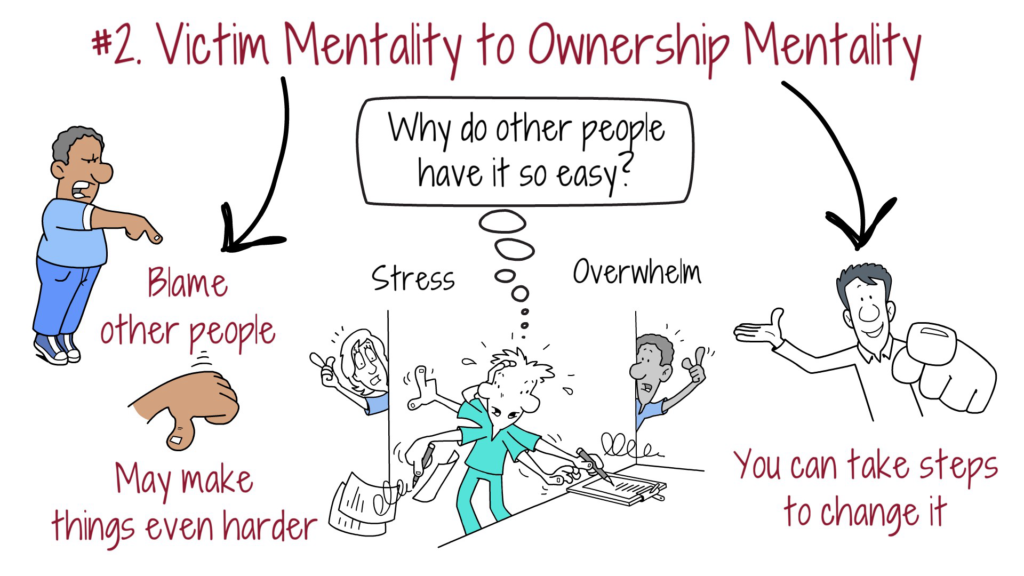
People who think with a victim mentality might find themselves blaming other people for their lot in life, instead of taking responsibility for it. This type of thinking can attract drama and misfortune making things even harder. You may not even realize you’re thinking on these terms because it becomes so automatic.
It’s not your fault if you’ve had this way of thinking since childhood, but once you’re aware of it, you can take steps to change it. Owning what happens to you puts the power back in your hands. You can’t control outside forces, but you can always control how you choose to respond.
By cultivating an ownership mentality, instead of asking “Why me?” or “When do I get a lucky break?”, you can ask yourself, “What do I want?” or “How can I create a better life?” People with an ownership mentality focus on what they want, not on what they “don’t” want. They know they are accountable for achieving their goals and don’t blame others when they run into obstacles along the way.
Steve Chandler, author of Reinventing Yourself described one difference he observed about these two mindsets,
“…owners were ‘designing a life’, while victims were ‘trying to make a living…’”
When you have an ownership mentality, you can shift your focus to encompass a sense of clarity, responsibility, and self-compassion, and start creating the life you truly want.
Scarcity to Abundance
When you are living in scarcity you may avoid taking risks. But some degree of risk taking can actually lead to more opportunities for growth. If you have a mindset of “not having enough” you might be afraid to spend money, time or energy because you think there is a limited supply. You might be fearful of running out of resources.
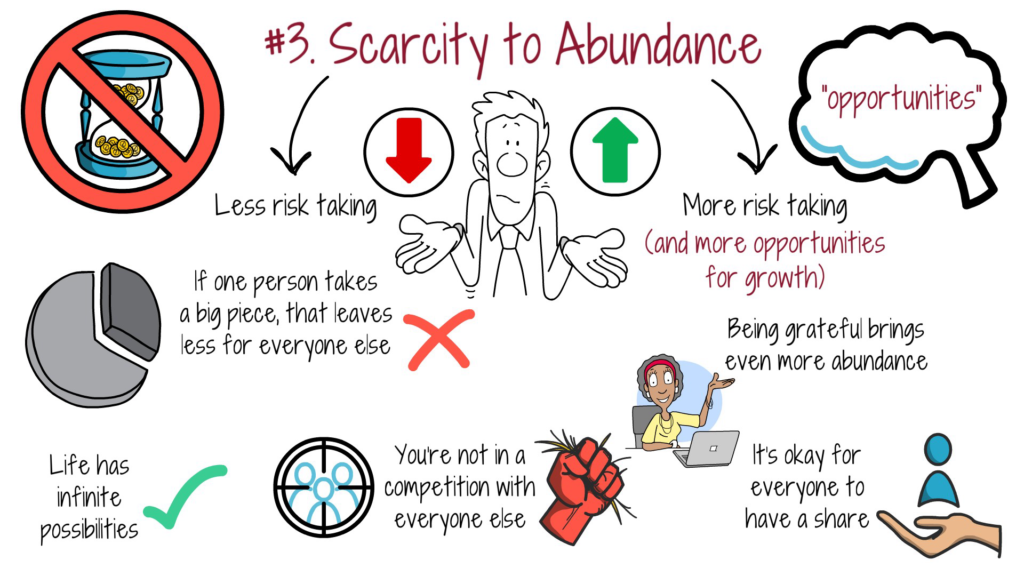
In his book, The 7 Habits of Highly Effective People, Stephen Covey talks about how some people view life as a finite pie. If one person takes a big piece, that leaves less for everyone else. But in truth, life has infinite possibilities.
Living with a scarcity mindset can make you feel that you are in competition with everyone else. You might do things like accept offers you don’t really want because you fear you might not have any other options. You might feel as though you have to hold on to things very tightly for fear of losing them.
When you have an abundance mindset you realize there is plenty of everything and it’s okay for everyone to have a share. Being grateful brings even more abundance. When you have an attitude of gratitude for what you already have, it may eliminate feelings of “lack.”
When you train your brain to see opportunities, instead of obstacles, you may find more choices and resources. Then the world starts to look more like abundance, than scarcity.
Perfectionism to Progress
Scientist Stephen Hawking said,
“Perfection simply doesn’t exist. That is the basic rule of the Universe.”
Perfection is an unattainable goal. It can cause you to feel unnecessary pressure and become overwhelmed. Sometimes it can lead to burn-out, depression, and anxiety. Perfection is an unrealistic expectation.
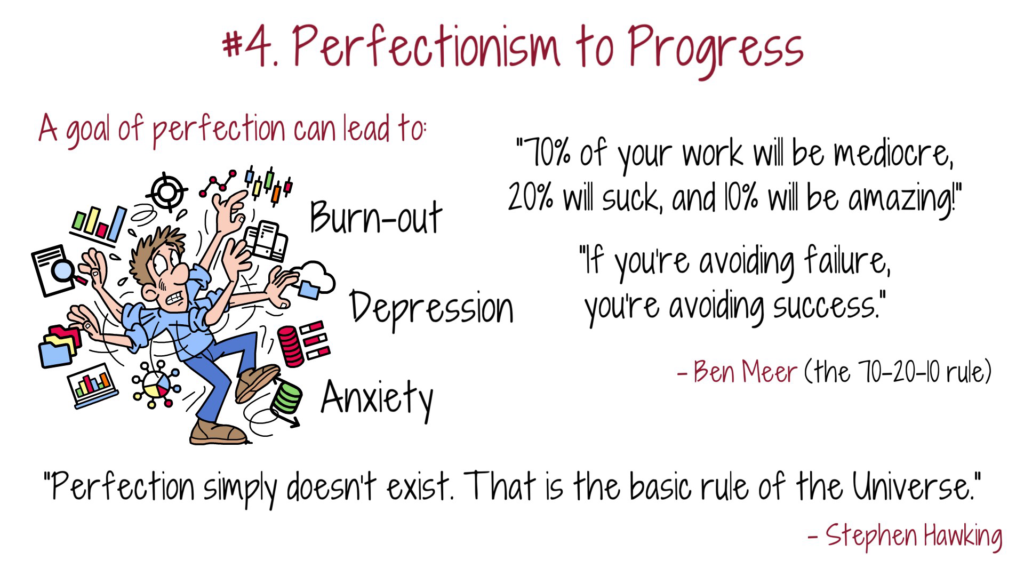
Writer Ben Meer suggests beating perfectionism with the 70-20-10 rule. He explains, “70% of your work will be mediocre, 20% will suck, and 10% will be amazing!” He continues, “If you’re avoiding failure, you’re avoiding success.”
When you focus on being perfect you could even undermine your own confidence. It may have the opposite effect you are hoping for. If you are seeking perfection, you may be afraid to try or move forward for fear of not being good enough.
Alternatively, perfectionism might also have an effect that makes you feel like you’re already so good that you have nothing left to learn. Either way, trying to be perfect, and produce perfect work is an exhausting game with unlikely rewards.
Winston Churchill stated,
“Perfection is the enemy of progress.”
It may actually prevent you from reaching your goal, by discouragement and defeat.
In contrast, progress promotes continual growth and advancement. Making progress helps you to acknowledge the goals you meet, and gives you things to celebrate. It leaves room for flexible thinking and new possibilities. People who prioritize progress over perfection may feel happier, because they know they did their best and recognize their strengths. Finding ways to learn more, they can keep moving forward.
Negative to Positive
Thinking negatively is like a black hole that keeps you stuck in a downward spiral. It restricts the way you think about solving problems, look for opportunities and how you reach your goals. If you constantly tell yourself that things are bad and are not going to work out, you will probably create a self-fulfilling prophecy.
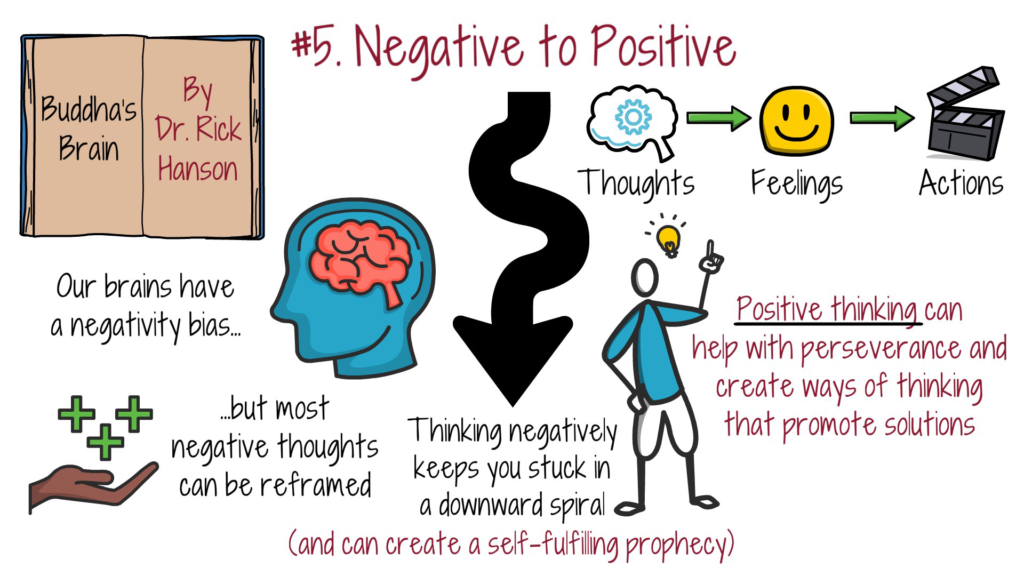
In the book, Buddha’s Brain, Dr. Rick Hanson says that human brains have a negativity bias. It’s part of our survival mechanism, and we’re always scanning our environment for threats. This is helpful if there is real danger, but in most cases negative thoughts can be reframed with more positive outlooks.
Thinking positive doesn’t mean everything will go perfectly all the time, but it could help with perseverance and create ways of thinking that promote solutions. A positive attitude may draw more opportunities your way.
Final thoughts
If you really want things to change, you have to actually do something different.
Thoughts create feelings, and feelings create actions. So by changing your mindset, you might just find that you can, indeed, change your life.
